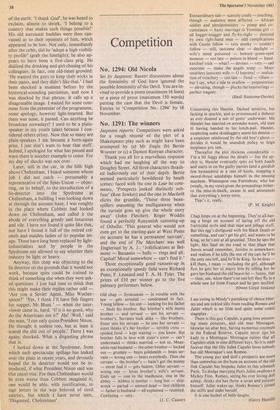No. 1291: The winners Jaspistos reports: Competitors were asked for
a rough resume of the plot of a Shakespeare play such as might have been attempted by (a) Mr Jingle (b) Bertie Wooster or (c) a Damon Runyan character.
Thank you all for a marvellous response which had me laughing all the way to Doughty Street. All three characters thrash- ed ludicrously out of their depth. Bertie seemed particularly bewildered by heath scenes: faced with the one in Lear he com- ments, 'Prospects looked distinctly sub- fusc' (Ron Jowker) and the one in Macbeth elicits the grumble, 'Those three bean- spillers seasoning the mulligatawny when the curtain goes up give the whole story away' (John Fletcher). Roger Woddis found a perfectly Runyanish summing-up of Othello: 'This general who would not even get to the starting-gate at West Point on account he has a permanent sun-tan', and the end of The Merchant was well Jinglerised by A. J.: 'Jollifications at Bel- mont — Bassanio — balls — rings and all. Capital! Moral somewhere — can't find it.'
Three exceptionally good runners-up in an exceptionally speedy field were Richard. Penn, F. Leonard and T. A. H. Tyler. The prizes of £10 per winner go to the five palmary performers below.
Old chap — Syracusean — in trouble with the law — gets arrested — condemned in fact. Young fellow — his son — looking for his father
— finds his brother. But brother's wife meets brother — and servant — not his servant brother's. Servants look alike — like brothers. Sister sees his servant — he sees her servant sister thinks it's her brother — terribly cross spoiled food — kept waiting — you know. But brother falls in love with sister's sister — can't understand — thinks married — not so. Mean- while real husband — the other brother — locked out — grumpy — beats goldsmith — beats ser- vant — wrong one — beats everybody. Then the servant — the brother's — hasn't got the money — never had it — gets beaten. Other servant wrong one -- loves brother's wife's servant. Ends up — one in the madhouse, one in the abbey — Abbess is mother — long lost — ship- wreck — parted — seemed dead — lost children
— father is husband — all explained — reunited. Confusing — very. (J. C. Causer)
Extraordinary tale — scarcely credit — touching, though — audience most affected — African soldier and plenipotentiary — pomp and cir- cumstance — hasty marriage to Venetian girl all hugger-mugger and fly-by-night — detested by own right-hand man — odd complications with Cassio fellow — very murky — couldn't follow — still, outcome clear — daylight wife's mind poisoned — beware green-eyed monster — too late — poison in blood — hand- kerchief trick — what? — devious — very — sad outcome — make the angels weep — Moor smothers innocent wife — 0 heavens! — realisa- tion of treachery — too late — fiend — villain but I say, what a tale to swallow — preposterous — elevating, though — plucks the heartstrings perfect tragedy.
(Basil Ransome-Davies)
Concerning this Hamlet. Dashed sensitive, but lacking in sparkle, and as pronounced a ditherer as ever donned a suit of gents' underwear. Ma Hamlet has married en secondes noces, old man H having handed in his lunch-pail. Hamlet, suspecting some skulduggery anent his demise a suspicion reinforced by the old boy's ghost decides it would be soundish policy to feign loopiness pro tern.
Thereafter the plot thickens considerably I'm a bit foggy about the details — but the up- shot is, Hamlet eventually spits on both hands and starts in on the guilty parties (and a goodish few bystanders) at a rate of knots, stopping a sword-thrust amidships himself in the ensuing mayhem. Whereupon one Fortinbras, who has (wisely, in my view) given the proceedings hither- to the miss-in-baulk, swans in and announces that everything's hotsy-totsy.
That's it, really, (P. M. Knight)
Chap limps on at the beginning. They're all hav- ing a binge on account of laying off the old fratricidal strife and that rape and pillage stuff. But this egg's disfigured with the Black Death or something, and can't get his girl, and wants to be King, so he's not at all gruntled. Then he sees the light, like Saul on the road to that place that Jeeves would remember, Jericho or somewhere, and realises if he kills the rest of the cast he'll be the only one left, and he'll be King. So he does kill them, I mean — including the girl, although first he gets her to marry him by telling her he gave her husband the old heave-ho — funny, that — then, um, when there's no one left they fly in a whole new lot from France and he gets snuffed.
(Owen Lloyd Jenkins)
I am sitting in Mindy's partaking of cheese blint- zes and am tickled silly from reading Romeo and Juliet which is no little and quite some comic stageplay.
There is this guy Capulet, a gang boss possess- ing many potatoes, and old man Montague, likewise no altar boy, having numerous coconuts in the Federal Reserve. Capulet never tips his kady to a Montague. Montague opines that all Capulets stink in nine different keys. So it is odds forever that the filly Juliet Capulet loves nobody but old Montague's son Romeo.
The young guy and doll's prospects are more than somewhat on the bum on account of the old fink Capulet has bespoke Juliet to this schmuck Paris. To dodge marrying Paris Juliet swallows a Mickey Finn. Romeo, seeing his ever loving doll asleep, thinks she has threw a seven and poisons himself. Juliet wakes up, thinks Romeo's joined the stiffs and stabs herself.
It is one bushel of belly-laughs. (Gerry Hamill)














































 Previous page
Previous page